The Rev. Nicholas Lang
preached a sermon called "Inviting Trouble" at St. Paul's on the Green in Norwalk, Connecticut, that talked about why his church was to be a radically welcoming community. He gave the example of Jesus' life and then told of some radically unwelcoming situations
Stories-especially true stories-speak well to the relevance of the Scripture for our time. Last year, a priest in Delaware refused a child the opportunity to make his first communion. The reason? The child has cerebral palsy. The priest said the boy could not possibly understand the meaning of the Holy Eucharist. His parents were devastated.
The Rev. Nancy J. Lane, an Episcopal priest from the Diocese of Central New York believes wholeheartedly in Jesus’ commitment to the healing of body and soul. In 1983 she established a ministry to educate congregations to be more welcoming and inclusive of people with disabilities. Mother Lane has cerebral palsy.
Henderson Brome, an African-American man was arrested in Milton, Massachusetts, in 1990 as he did his daily three-mile walk one morning. He was handcuffed near his home after a police officer took him for a suspect who had been spotted breaking into a car. The description they got was of a “tall, thin, black male,” but it was not this man. The Boston Globe later reported the incident along with these remarks by the man who was arrested: “I never resisted. I never did anything. I tried to tell them I was an Episcopal priest. I tried to tell him I lived on the street. He didn’t even ask who I was. He wasn’t interested. All he saw was a black man.” He is the rector of St. Cyprian’s Church, Roxbury...
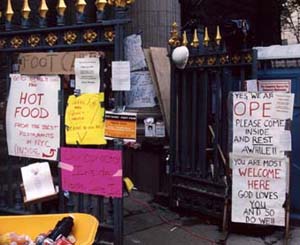 Stories of hospitality, expanding the table; stories of exclusion and building prison walls. Mother Lane, the priest who lives with cerebral palsy, writes “Healing happens when we are welcomed, included, and our gifts received because we are part of the body of Christ. As I traveled around the country I discovered enormous suffering in people with and without disabilities.
Stories of hospitality, expanding the table; stories of exclusion and building prison walls. Mother Lane, the priest who lives with cerebral palsy, writes “Healing happens when we are welcomed, included, and our gifts received because we are part of the body of Christ. As I traveled around the country I discovered enormous suffering in people with and without disabilities.
And in a
a forum on the Dream of Radical Welcome Stephanie Spellers, Minister of Radical Welcoming at St. Paul's Cathedral in Boston, said in part
Welcome is bold yet tasteful signage outside. Welcome is nametags for members and newcomers when they walk inside. Welcome is that warm greeting at the doorway, and an attractive and compelling set of materials for newcomers. It is a friendly member who scoots over to make room for a stranger in the pew. It is another intentional member who leans over to help the person struggling to find their way through the liturgy.
Welcome is really good coffee and irresistible munchies in the Undercroft. It is also a follow-up call from a clergy person or a lay visitor. It is an invitation to join a small group and journey together.
We need welcome. The church is dead without welcome. So do check to see if you're welcoming and commit to providing that inviting space. But please don't stop there, because that is not yet radical welcome.
Radical welcome kicks welcome to the next level. It asks, Who would never even come to the door, because they are so sure we will not receive them, and because, historically, we have not?
It asks, how do we make sure that people on the margins know as soon as they walk in that things have changed in here? How do we make it crystal clear that we are making room for their voices, their presence, their power, at the heart of our life together?
From the unwelcoming priest who refused communion to a person with cerebral palsy to the radical welcome of asking who isn't even coming because they don't feel they will be received. The idea of radical welcome reminds me of Chris Duncan's funeral, held at King of Peace on February 12, 2005. I pray
the sermon was both radically welcoming and grace-filled in a time of pain and loss.
That day we welcomed a congregation of 400 hurting people into our sanctuary. As Chris Duncan was high school aged, the congregation included many teens who would not usually attend our church. Many of those there are among the ones who don't feel they would be received because of their clothes, their piercings, their tattoos...We really didn't mind. We really were glad they came. We really didn't judge.
How do we show others that they are in fact already welcomed...radically?
peace,
Frank+
The Rev. Frank Logue, Pastor +
King of Peace Episcopal Church
There are days when I say aloud, "Thank you God! Thank you God! For not saying yes!"
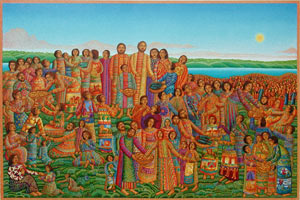
 It’s no secret that St Michael’s Episcopal Church in Waynesboro, Georgia will never take the place of the Washington National Cathedral.
It’s no secret that St Michael’s Episcopal Church in Waynesboro, Georgia will never take the place of the Washington National Cathedral.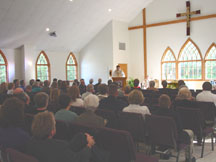 Just because the words are the same each week does not mean the message of God’s love for us becomes less important, less true. Think about the meaning behind the words, the fact that they are the joyful proclamation of God’s grace in our lives. We are called not only to spread the good news to others but to remind ourselves of it, not only to believe but to proclaim our belief in our worship and praise. If we can do this we can open our hearts and minds to what God may be trying to say to us rather than becoming mired in meaningless words.
Just because the words are the same each week does not mean the message of God’s love for us becomes less important, less true. Think about the meaning behind the words, the fact that they are the joyful proclamation of God’s grace in our lives. We are called not only to spread the good news to others but to remind ourselves of it, not only to believe but to proclaim our belief in our worship and praise. If we can do this we can open our hearts and minds to what God may be trying to say to us rather than becoming mired in meaningless words. Expect to have hope rekindled. Expect your prayers to be answered in wondrous ways. The dry seasons in life do not last. The spring rains will come again.—Sarah Ban Breathnach
Expect to have hope rekindled. Expect your prayers to be answered in wondrous ways. The dry seasons in life do not last. The spring rains will come again.—Sarah Ban Breathnach 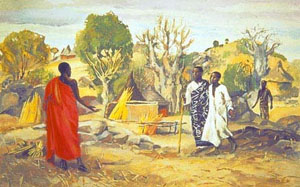 Christ understood that being a “disciple” was in innermost and deepest harmony with what he said about himself. Christ claimed to be the way and the truth and the life (Jn. 14:6). For this reason, he could never be satisfied with adherents who accepted his teaching – especially with those who in their lives ignored it or let things take their usual course. His whole life on earth, from beginning to end, was destined solely to have followers and to make admirers impossible.
Christ understood that being a “disciple” was in innermost and deepest harmony with what he said about himself. Christ claimed to be the way and the truth and the life (Jn. 14:6). For this reason, he could never be satisfied with adherents who accepted his teaching – especially with those who in their lives ignored it or let things take their usual course. His whole life on earth, from beginning to end, was destined solely to have followers and to make admirers impossible. True prayer acknowledges that of ourselves we are incapable of striking the right course in prayer. True prayer demands complete surrender and complete confidence, so that we can say, "We do not know what we ought to pray for, but the Spirit himself intercedes for us with groans that words cannot express" (Romans 8:26-30).
True prayer acknowledges that of ourselves we are incapable of striking the right course in prayer. True prayer demands complete surrender and complete confidence, so that we can say, "We do not know what we ought to pray for, but the Spirit himself intercedes for us with groans that words cannot express" (Romans 8:26-30). What do I need to stop doing, that I'm currently doing, so that I can focus more of my time and energy on the things that matter most and will create the greatest impact over the course of my life and time?
What do I need to stop doing, that I'm currently doing, so that I can focus more of my time and energy on the things that matter most and will create the greatest impact over the course of my life and time?
 The kingdom of heaven is like treasure hidden in a field, which someone found and hid; then in his joy he goes and sells all that he has and buys that field.
The kingdom of heaven is like treasure hidden in a field, which someone found and hid; then in his joy he goes and sells all that he has and buys that field.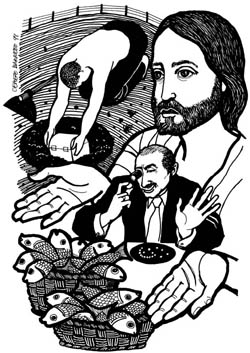 While we normally assume that giving up everything for a pretty woman (or handsome man) is foolishness or uncontrollable lust or blind infatuation; I think there are similarities with being grasped by the desire to have the treasure in the field (or the pearl of great value in the next parable). I have seen people give up family and jobs because they had been grasped by alcohol or other addictive drugs. I had started to write, "they have turned their lives over to ...." But, at least with addictive substances, it is not a "turning over" so much as the drugs or alcohol grabs one's life and takes it away. The addictive substances (or lustful desires) take control of one's life -- and leaves one "out of control." Should we say that the kingdom of heaven is like that? It takes control of our lives.
While we normally assume that giving up everything for a pretty woman (or handsome man) is foolishness or uncontrollable lust or blind infatuation; I think there are similarities with being grasped by the desire to have the treasure in the field (or the pearl of great value in the next parable). I have seen people give up family and jobs because they had been grasped by alcohol or other addictive drugs. I had started to write, "they have turned their lives over to ...." But, at least with addictive substances, it is not a "turning over" so much as the drugs or alcohol grabs one's life and takes it away. The addictive substances (or lustful desires) take control of one's life -- and leaves one "out of control." Should we say that the kingdom of heaven is like that? It takes control of our lives. The early disciples had little ritual but a mighty realization. They went out not remembering Christ, but experiencing him. He was not a mere fair and beautiful story to remember with gratitude - he was a living, redemptive, actual presence then and there. They went out with the joyous and grateful cry, "Christ lives in me!" The Jesus of history had become the Christ of experience.
The early disciples had little ritual but a mighty realization. They went out not remembering Christ, but experiencing him. He was not a mere fair and beautiful story to remember with gratitude - he was a living, redemptive, actual presence then and there. They went out with the joyous and grateful cry, "Christ lives in me!" The Jesus of history had become the Christ of experience.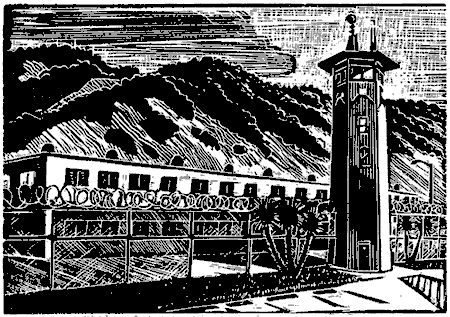 An
An  Tramel, a member of the Church of the Good Shepherd in Berkeley, met with members of his congregation and the Commission on Ministry through letters, over the phone, and in the visiting room at Solano Prison. While conducting his studies, Tramel began an Episcopal congregation at the prison, which started with a group of inmates saying prayers from the Episcopal Book of Common Prayer. Eventually, the congregation grew, and chaplains began visiting to conduct full communion services.
Tramel, a member of the Church of the Good Shepherd in Berkeley, met with members of his congregation and the Commission on Ministry through letters, over the phone, and in the visiting room at Solano Prison. While conducting his studies, Tramel began an Episcopal congregation at the prison, which started with a group of inmates saying prayers from the Episcopal Book of Common Prayer. Eventually, the congregation grew, and chaplains began visiting to conduct full communion services. Arriving at the church of San Lucas, which was located in a tiny community with no running water or electricity, I was thrust into intense culture shock. All of my preconceived notions about forming bonds in the Church were thrown out the window. There were no newcomer’s cards, potluck luncheons or “get to know you” chats over coffee hour. I couldn’t understand a word that anyone said and felt lost, thinking I would have no way to make any real connections.
Arriving at the church of San Lucas, which was located in a tiny community with no running water or electricity, I was thrust into intense culture shock. All of my preconceived notions about forming bonds in the Church were thrown out the window. There were no newcomer’s cards, potluck luncheons or “get to know you” chats over coffee hour. I couldn’t understand a word that anyone said and felt lost, thinking I would have no way to make any real connections.  i went. by myself. i was 12. two things happened that sunday. one, a homeless woman came into the church after the service was well underway. she shuffled up the center aisle with her bags, looking pretty scruffy. i held my breath, wondering what people would do. i guess i thought they would throw her out. everyone else looked pretty smart. instead of throwing her out, a woman in the pew ahead of this woman turned around. she was tall, thin, wearing a nice dress, pearls, coiffed hair - really, a classic wasp. i remember watching all this agog. she turned to face the bag lady and her face lit up! she smiled and threw her arms around this homeless woman and hugged her as if she were an old friend she hadn't seen in years.
i went. by myself. i was 12. two things happened that sunday. one, a homeless woman came into the church after the service was well underway. she shuffled up the center aisle with her bags, looking pretty scruffy. i held my breath, wondering what people would do. i guess i thought they would throw her out. everyone else looked pretty smart. instead of throwing her out, a woman in the pew ahead of this woman turned around. she was tall, thin, wearing a nice dress, pearls, coiffed hair - really, a classic wasp. i remember watching all this agog. she turned to face the bag lady and her face lit up! she smiled and threw her arms around this homeless woman and hugged her as if she were an old friend she hadn't seen in years.


 I think there are many folks who are being fed sugar-glazed theology and they leave the building with a sugar rush having consumed 1,000 calories of bad theology thinking they have been fed when in realty they are just buzzing from the sugar.
I think there are many folks who are being fed sugar-glazed theology and they leave the building with a sugar rush having consumed 1,000 calories of bad theology thinking they have been fed when in realty they are just buzzing from the sugar. 

 The story is told of a poor grass cutter who found a beautiful stone in the jungle. He had often heard of people finding valuable diamonds and thought this must be one. He took it to a jeweler and showed it to him with delight. Being a kind and sympathetic man, the jeweler knew that if he bluntly told the grass cutter that his stone was worthless glass, the man would either refuse to believe it or else fall into a state of depression. So instead, the jeweler offered the grass cutter some work in his shop so that he might become better acquainted with precious stones and their value.
The story is told of a poor grass cutter who found a beautiful stone in the jungle. He had often heard of people finding valuable diamonds and thought this must be one. He took it to a jeweler and showed it to him with delight. Being a kind and sympathetic man, the jeweler knew that if he bluntly told the grass cutter that his stone was worthless glass, the man would either refuse to believe it or else fall into a state of depression. So instead, the jeweler offered the grass cutter some work in his shop so that he might become better acquainted with precious stones and their value. King of Peace strives to be the sort of church that you'll enjoy if you were always the kid constantly raising your hand in Sunday school class. After all, the Yellow Pages ad for King of Peace says "We value questions." Aren't questions the sign of an active faith?
King of Peace strives to be the sort of church that you'll enjoy if you were always the kid constantly raising your hand in Sunday school class. After all, the Yellow Pages ad for King of Peace says "We value questions." Aren't questions the sign of an active faith? Accept, O Lord, our thanks and praise for all that you have done for us. We thank you for the splendor of the whole creation, for the beauty of this world, for the wonder of life, and for the mystery of love.
Accept, O Lord, our thanks and praise for all that you have done for us. We thank you for the splendor of the whole creation, for the beauty of this world, for the wonder of life, and for the mystery of love. What will happen is that I will go in on Sunday morning in full touch with the absurdity of the situation, feeling like a faker and a hypocrite. Then, during Eucharist, I will lay hands on the first head that comes before me, and I will say the prayer for healing. And I will be completely present in the moment, which is transported outside of space and time while still being firmly rooted in the here and now, and God's grace will flow through me. I will do this again and again, for each person who comes to me. When it is over, I will realize once again why I continue in this ministry. I am not a faker and a hypocrite. I do not have healing power. All I can do is humble myself, put myself into the background, and let God work through me.
What will happen is that I will go in on Sunday morning in full touch with the absurdity of the situation, feeling like a faker and a hypocrite. Then, during Eucharist, I will lay hands on the first head that comes before me, and I will say the prayer for healing. And I will be completely present in the moment, which is transported outside of space and time while still being firmly rooted in the here and now, and God's grace will flow through me. I will do this again and again, for each person who comes to me. When it is over, I will realize once again why I continue in this ministry. I am not a faker and a hypocrite. I do not have healing power. All I can do is humble myself, put myself into the background, and let God work through me.

 "Ultimately, however, ethics is not about what we say or what we intend, it’s about what we do,” says Jim Lichtman. Given a choice between Loyalty and Honesty, almost half of those surveyed (43%) would compromise their integrity for the sake of a friend. Given a choice between having an unethical relationship within the company, 32% would disregard company rules. And, given the right circumstances, 46% would look the other way or encourage unethical sales tactics in order to meet sales needs. “Do ethics still matter? Clearly most 18-24 year-olds believe they do,” Lichtman says. “Yet, when values conflict many show a readiness to compromise.”
"Ultimately, however, ethics is not about what we say or what we intend, it’s about what we do,” says Jim Lichtman. Given a choice between Loyalty and Honesty, almost half of those surveyed (43%) would compromise their integrity for the sake of a friend. Given a choice between having an unethical relationship within the company, 32% would disregard company rules. And, given the right circumstances, 46% would look the other way or encourage unethical sales tactics in order to meet sales needs. “Do ethics still matter? Clearly most 18-24 year-olds believe they do,” Lichtman says. “Yet, when values conflict many show a readiness to compromise.”
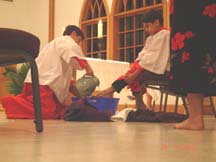
 I once heard a Holocaust survivor asked if her experience of a death march and forced labor camp hadn't destroyed her faith in God. "Of course," she said, adding, "but only for a time." She had come to the conclusion that what she and so many others had endured was not God's doing, but was due to human beings having chosen to do evil. She said she now believed that God was good, but had given people the ability to choose between good and evil. As for the terrors that she and the other Jews of her village had endured, she had come to believe that God had been there all the time, suffering with them....
I once heard a Holocaust survivor asked if her experience of a death march and forced labor camp hadn't destroyed her faith in God. "Of course," she said, adding, "but only for a time." She had come to the conclusion that what she and so many others had endured was not God's doing, but was due to human beings having chosen to do evil. She said she now believed that God was good, but had given people the ability to choose between good and evil. As for the terrors that she and the other Jews of her village had endured, she had come to believe that God had been there all the time, suffering with them....

 The
The  Items like no time, long, boring, irrelevant, they ask for money and there are too many hypocrites sound like they would apply to men and women equally. Do the men you know fall into these? If you are a man, are any of these relevant for you? How would a woman's list look different?
Items like no time, long, boring, irrelevant, they ask for money and there are too many hypocrites sound like they would apply to men and women equally. Do the men you know fall into these? If you are a man, are any of these relevant for you? How would a woman's list look different? 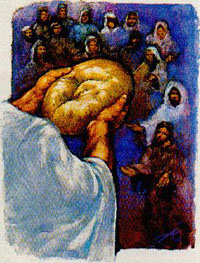 Archbishop of Canterbury Rowan Williams said this week,
Archbishop of Canterbury Rowan Williams said this week,







0 Comments:
Post a Comment
<< Home